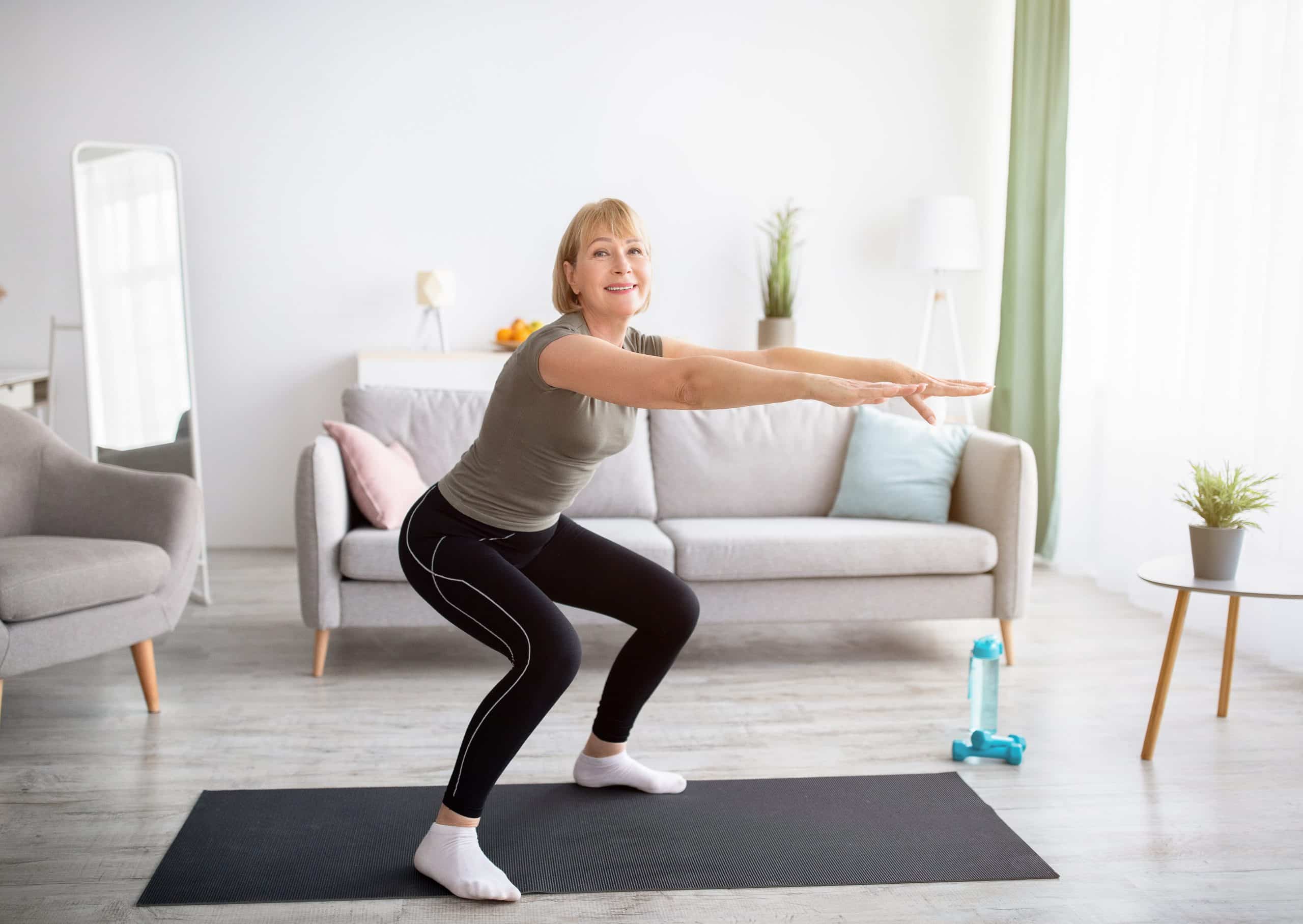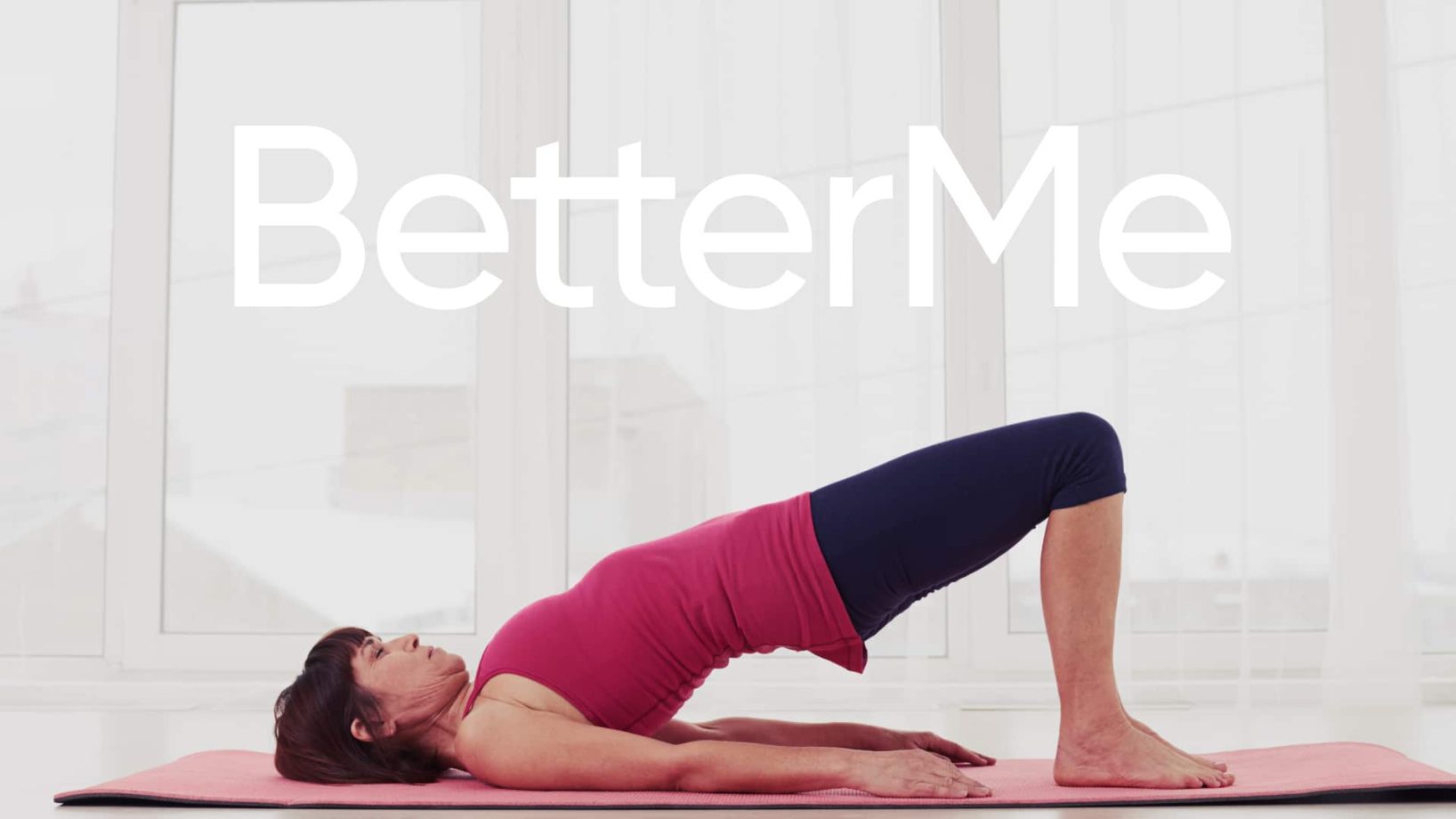Have you been trying hard to shed extra pounds since you crossed the 50 age mark but are thinking of giving up? Losing weight can be pretty challenging after the 50s, with both men and women struggling to maintain their fitness.
Factors like aging, slowing metabolism, and underlying health conditions may hinder your weight loss goals. While you may not get instant results, as you did when you were young, you can still lose weight after 50 by following the right diet plan and working out.
What is The Fastest Way to Lose Weight After 50?
What is the fastest way to lose weight? Weight loss is a journey. You cannot shortcut your way to shedding pounds and getting fit instantly. It is about moving around more, burning calories, working out, and eating consistently healthy to inch closer to your fitness goals.
The good news is that you can do all that by being disciplined and showing perseverance. Let’s look at the best ways to lose weight after 50 so you can know where to start.
BetterMe app will kick you out of the mental funk, shake off your extra weight, rid you off your energy-zapping habits, and help you sculpt the body of your dreams. Intrigued? Hurry up and change your life for the better!
Get More Active
When we grow older, we tend to fall into a sedentary lifestyle by sitting around all day and spending our retirement days resting. Some of us have office jobs where we sit in front of the computer all day.
Research suggests that having a sedentary lifestyle may contribute to obesity, cardiovascular conditions, and poor health (1).
If you want to lose weight after 50, you need to burn calories by being active and moving around a lot more. If you have a desk job, you can take little breaks between your shift and go on a stroll. Taking a 5-minute walk break every hour reduces your time sitting and might improve your overall health (2). It can also help to work more movement into your day wherever it feels natural. Things like taking the stairs instead of the elevator, parking further away, or cycling to work when/if possible can add up and contribute to a more active lifestyle.
Take Up Weights
Do you know that after your 50s your muscle mass may decrease by 1-2% and muscle strength by 2% yearly? (3) This may happen because the muscle mass gradually declines as you age through a process called age-related sarcopenia. When you have less muscle mass, you expend less energy through normal metabolism. This can contribute to weight gain..
To counter that, you can incorporate strength training, such as weight lifting and bodyweight workouts, to improve your muscle strength (4). This can help you retain more muscle mass, which takes more energy to maintain than fat tissue, plus the workouts themselves burn some extra calories.
Find a Workout Buddy
The thought of working out alone often prevents us from picking up the weights but getting a buddy could motivate us to do more.
A study reveals that attending a weight loss program with our friend or a partner may help us maintain weight loss over a long time (5). We may find working out more enjoyable and stay committed to it indefinitely.
Hire a Personal Trainer
When starting, you may not have all the necessary weight-loss resources. A personal trainer can create personalized workout plans based on your fitness levels. They also support you and motivate you to work hard so you stay on track.
Lower Stress
Stress can drive us to eat more food as a source of comfort, leading to weight gain. Stress also stimulates cortisol, a hormone associated with high anxiety that may increase hunger and cravings, contributing to weight gain.
Try to combat stress by dedicating a few minutes to yourself in some quiet corner or practicing meditation. Alternatively, you can also do yoga, which calms your nerves and relaxes your mind.
Get More Sleep
Getting less sleep daily impedes our weight loss efforts. Studies reveal a direct link between poor sleep quality and obesity (6). Chances are you may be gaining weight due to staying up all night and sleeping less than adults’ required amount of sleep.
According to a study, women who slept more than 7 hours per night were 33% more likely to lose weight than those who slept less (6).
If you have difficulty falling asleep, try to eliminate all sorts of distractions, limit screen time in the evening, and implement a bedtime routine to help get a good night’s sleep (7).
Improve Your Diet
If you are trying to lose weight after 50, there may be some changes you can make to your diet that might help. The first is to include protein-rich foods at every meal or snack.. Proteins are the building blocks of muscles, so eating a protein-rich diet can help slow down age-related muscle loss, and it helps you feel more full, which can help you eat less overall (8).
The second change you can make is to include more fruits and vegetables in your diet. Try to fill up half your plate with fruits and vegetables at each meal. These are filling because they contain fiber, are highly nutritious and low in calories. A study revealed that individuals who ate more fruits and vegetables tended to have lower BMIs, less fat mass, and smaller waist circumferences (9).
Fruit also makes a great snack and can satisfy a sweet craving for fewer calories than most sweet treats..
Do Not Skip Breakfast
Breakfast is the most important meal of the day, as your entire day starts with what you have for breakfast. We may skip breakfast to lose weight, but some studies suggest a link between skipping breakfast and obesity (10).
A proper breakfast gives your body sufficient nutrients and energy for the day. Also, if you choose something nutritious and filing, you may avoid overeating later.
Read more: Low-Impact Cardio Workout Plans for Beginners and Seniors at Home or the Gym
Is it Really Harder to Lose Weight After 50?
To lose weight after 50 is usually more difficult than it was in your 20s, but not impossible. Several factors contribute to weight gain after 50.
Menopause
While weight loss is significantly harder, it is even more difficult for women as women lose weight after 50 a bit slower than men. This is mainly due to hormonal changes caused by menopause. Menopause causes a decline in estrogen levels, due to which fat tends to shift to the abdominal area.
Abdominal fat is particularly hard to lose and might increase the risk of stroke, cardiovascular diseases, and type II diabetes (11).
This is why many women often complain of gaining weight, especially around the midsection, despite eating less and being active.
Aging
Aging also causes a decline in metabolism in both men and women. That is why individuals above 50 typically require fewer calories than they did in their youth. Declines in muscle mass, less active lifestyles, and other changes associated with aging lead to less energy burned and lower calorie requirements. To amp metabolism, individuals can:
- Do strength training: lifting weights and doing bodyweight exercises may help you retain your muscle mass and strength, which leads to more calories burned even at rest..
- Do breakfast: Having a nutritious breakfast in the morning provides your body fuel to facilitate the day. It also prevents you from overeating and snacking later in the day.
- Eat more protein: weight loss after 50 diet plans often emphasize proteins. A protein-rich diet including fish, eggs, meat, and tofu may help boost metabolism.
Loss of Muscle Mass
Muscle mass rapidly declines as you age. Since more muscles burn calories, a decline in muscle mass may cause weight gain and make it a bit harder to shed weight.
A Sedentary Lifestyle
With passing age, staying active becomes harder for many individuals due to joint stiffness and declining energy and metabolism. Changes in daily activities, such as retirement, may also lead to a more sedentary lifestyle unless an effort is made to stay active.
Poor Diet
While you may be working out more, you may still not be witnessing drastic results due to having an unbalanced diet. It would be best to eat healthily to achieve that, as weight loss heavily depends on your diet. Incorporating healthy meals in your daily diet facilitates weight loss after 55 in females.
How to Lose Belly Fat After Age 50?
Belly fat is something that concerns the majority of us. The protruding belly is something many of us wish to lose. The cause of excess belly fat is not always simple. Factors such as genes, aging, and lifestyle might also contribute to it.
While losing belly fat might be easy in your 20s, it becomes more stubborn when you reach your 50s. To lose weight fast after 50, you can try the following strategies:
Exercise Regularly
Doing HIIT exercises or cardio such as walking, running, and swimming burns calories (13). Cardio is the best way to start working out and benefits your heart as well.
Cut Down On Sugar
While we may crave sugary foods, consuming too much added sugar may be detrimental to health and is one of the leading contributors to belly fat. To satisfy your sweet tooth, you can try swapping sweet treats for fruits that are a lot healthier and contain fewer calories.
Try Intermittent Fasting
Fasting is also a popular way of losing belly fat. You can do intermittent fasting by fasting for 16 hours and sticking to healthy, balanced meals during an 8-hour window. Some people find that this strategy helps them eat less overall, which promotes weight loss.
Eat a Well-balanced Diet
A balanced diet includes lean proteins, whole grains and legumes, plenty of fruits and vegetables, and healthy fats. These foods provide a lot of nutrients for a reasonable number of calories, and they are filling and satisfying. Many of them even help fight inflammation and insulin sensitivity, which are linked to having excess visceral fat in the abdominal area.
Portion control is also very important. The recommended serving sizes of many foods can be estimated by comparing them to your hand or common objects. For example: .
- The palm of your hand signifies one portion of protein or 3-4 ounces.
- Your clenched fist is about a cup, which is a serving of carbohydrates or fruit.
- Your entire thumb is about 2 tablespoons, which is a serving of peanut butter or cheese.
- The tip of your finger is about 1 teaspoon, and the tip of your thumb is one tablespoon. Serving sizes for fats like butter and oil and other condiments range between the two.
You can also use the plate method, which is another simple way of making sure your meals are balanced:
- Fill half your plate with non-starchy vegetables and/or fruit
- Fill one quarter with complex carbohydrates (starchy vegetables, grains, or legumes)
- Fill one quarter with lean protein like poultry, lean meats, fish, or plant-based protein
A sample meal plan for weight loss over 50 is: (17)
For Breakfast
- Have oatmeal with berries (one cupped handful)
- 1 cup of Greek yogurt
- 2 whole eggs
For Lunch
- Have 170–230 grams of turkey breast (two palms)
- 1 medium sweet potato with a tbsp. of butter
- 1-2 cups of mixed veggies.
For Dinner
- Have 170–230 grams of cooked steak (two palms)
- ½ cup of cooked rice (one cupped handful)
- 1 tbsp. of olive oil
- 2 cups of veggies like spinach, carrots, or cauliflower.
Lean and toned up body isn’t just a far-fetched fantasy. Check out the BetterMe app and watch it propel your weight loss journey into high gear!
Can A 50-year-old Woman Lose Belly Fat?
Middle-age weight gain can happen anytime but is the most noticeable when women reach their 50s. The onset of menopause causes many changes in the body, including weight gain.
The estrogen level drops significantly and encourages the fat to shift to the abdomen from the lower body. Also, the fat on your abdomen tends to be visceral fat around your internal organs, which may pose an increased risk for several diseases.
While losing weight for menopausal women is a bit hard, it’s not impossible. Women can lose weight significantly by following the right workout routine and diet. Here are a few tiny steps women can take to start their journey toward fat loss.
Explore A New Activity
If the thought of picking up weights makes you procrastinate, then consider finding a new hobby that you will enjoy. If you love socializing or group activities, sign up for sports like basketball or soccer. You can even join spin classes or join a Zumba session. If you enjoy doing things alone, you can explore your hiking, running, cycling, or swimming interests.
Drink Plenty of Water
If you habitually consume sugar-sweetened beverages like fruit juices or sodas, it may be time for a change. Sugary drinks are loaded with added sugar and calories that can contribute to significant weight gain, increasing the risks of heart disease and diabetes.
Break your habit by swapping sugary beverages for water or other zero-calorie drinks.
Cook at Home
Take-outs and restaurant meals tend to be high in calories.. Make a habit of cooking at home, allowing you to be more mindful of what you put into your dishes. Bring homemade lunch to stay on track.
Consult a Dietitian
Finding the right diet can seem daunting. Consulting a dietitian can help you get on track by following the meal plans that work for you. A dietitian can also provide guidance and support to lose weight easily after 50.
Get Tested
If you are experiencing issues with losing weight despite eating healthily and working out, you must consult your healthcare provider. Certain medical conditions like hypothyroidism or Polycystic Syndrome (PCOS) may affect your ability to lose weight. Your physician may prescribe medication to overcome these conditions and help you lose weight significantly.
Read more:Beginning Yoga For Seniors: Types, Poses, And Benefits.
The Bottom Line
To lose weight after 50, you can incorporate healthy activities like exercising, being active, and eating well. While losing weight may be hard, it is not entirely impossible.
Remember to get ample sleep, try to be more active, and consult your physician for more detailed advice on weight loss, especially if you have certain health conditions.
Frequently Asked Questions (FAQs)
How to lose weight after 50?
You should try to lead an active lifestyle to lose weight after 50. Eating healthy meals, working out consistently, and moving around are ways to get your desired weight.
How to lose weight after 50 and menopause?
Menopause causes significant weight gain, and managing weight to avoid certain health conditions is important. Exercises like cardio, strength training, and HIIT may help women combat post-menopause weight gain. Also, aging declines muscle mass; therefore, consuming high-protein foods along with strength training helps preserve muscle mass, ultimately burning more calories.
Is it possible to lose weight after 50?
It is quite possible to lose weight after 50. Getting enough sleep, staying active, and having a healthy breakfast in the morning help burn calories and facilitate weight loss.
How much weight can a 50-year-old woman lose in a month?
According to the Centers for Disease Control and Prevention (CDC), losing 1 to 2 pounds per week is likely safe and sustainable. This implies that losing 4 to 8 pounds a month is considered achievable. Obviously, that also depends on factors like genetics, aging, fat loss tendency, and lifestyle.
How to lose 10 pounds fast over 50?
Aiming to lose 10 pounds will require discipline and focus. Doing HIIT and consuming a reduced-calorie healthy diet are essential to losing weight fast. Lifting weights and doing bodyweight exercises are also helpful in losing over 10 pounds for 50-year-olds.
DISCLAIMER:
This article is intended for general informational purposes only and does not serve to address individual circumstances. It is not a substitute for professional advice or help and should not be relied on for making any kind of decision-making. Any action taken as a direct or indirect result of the information in this article is entirely at your own risk and is your sole responsibility.
BetterMe, its content staff, and its medical advisors accept no responsibility for inaccuracies, errors, misstatements, inconsistencies, or omissions and specifically disclaim any liability, loss or risk, personal, professional or otherwise, which may be incurred as a consequence, directly or indirectly, of the use and/or application of any content.
You should always seek the advice of your physician or other qualified health provider with any questions you may have regarding a medical condition or your specific situation. Never disregard professional medical advice or delay seeking it because of BetterMe content. If you suspect or think you may have a medical emergency, call your doctor.
SOURCES:
- Workplace interventions for reducing sitting at work (2018, ncbi.nlm.nih.gov)
- Association Between Sedentary Work and BMI (2015, ncbi.nlm.nih.gov)
- Strength and muscle mass loss with aging process. Age and strength loss (2014, ncbi.nlm.nih.gov)
- Resistance Exercise to Prevent and Manage Sarcopenia (2016, ncbi.nlm.nih.gov)
- Benefits of recruiting participants with friends and increasing social support for weight loss (1999, ncbi.nlm.nih.gov)
- Relationship Between Sleep Quality and Quantity and Weight Loss in Women (2012, ncbi.nlm.nih.gov)
- Routinely assessing patients’ sleep health is time well spent (2017, ncbi.nlm.nih.gov)
- Effects of Adherence to a Higher Protein Diet on Weight Loss, Markers of Health, and Functional Capacity in Older Women (2013, ncbi.nlm.nih.gov)
- Fruit and vegetable intake and body adiposity (2015, ncbi.nlm.nih.gov)
- Timing of Breakfast, Lunch, and Dinner. Effects on Obesity (2011, ncbi.nlm.nih.gov)
- Type 2 diabetes and cardiovascular disease: Have all risk factors the same strength? (2014, ncbi.nlm.nih.gov)
- Why is it so hard for women over 50 to lose weight? (2018, nch.org)
- HIIT vs. Cardio for Weight Loss (2023, health.usnews.com)
- Sugar (n.d., betterhealth.vic.gov.au)
- How to Get Rid of Belly Fat After Age 50 (2023, aarp.org)
- Healthy Eating Patterns and Risk of Total and Cause-Specific Mortality (2023, jamanetwork.com)
- The 3 Best Exercises to Lose Belly Fat After 50 (2023, strengthlog.com)
- Nutritional Challenges in Metabolic Syndrome (2019, ncbi.nlm.nih.gov)









